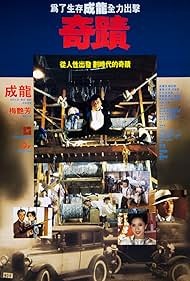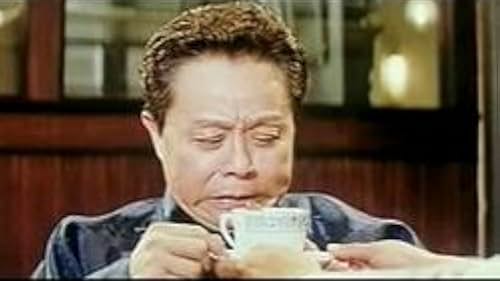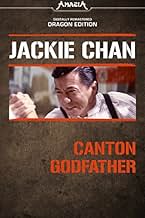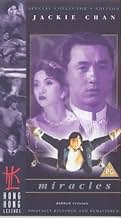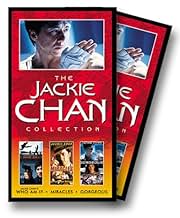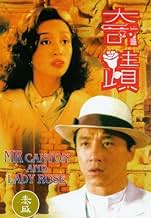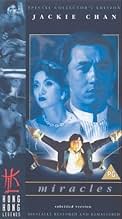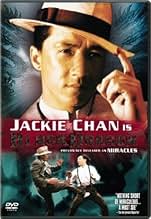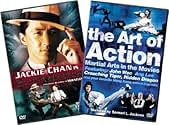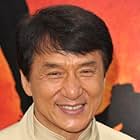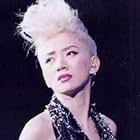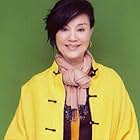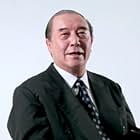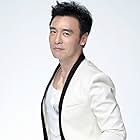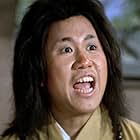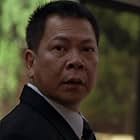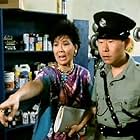IMDb RATING
6.9/10
5.6K
YOUR RATING
A country boy becomes the head of a gang through the purchase of some lucky roses from an old lady. He and a singer at the gang's nightclub try to do a good deed for the old lady when her da... Read allA country boy becomes the head of a gang through the purchase of some lucky roses from an old lady. He and a singer at the gang's nightclub try to do a good deed for the old lady when her daughter comes to visit.A country boy becomes the head of a gang through the purchase of some lucky roses from an old lady. He and a singer at the gang's nightclub try to do a good deed for the old lady when her daughter comes to visit.
- Awards
- 1 win & 8 nominations
Ah-Lei Gua
- Madam Kao
- (as Yah-Leh Gui)
Wai-Yu Chan
- Lady Rose's Friend
- (as Wai-Yue Chan)
Storyline
Did you know
- TriviaAccording to Jackie Chan's autobiography, of all the movies he's ever made, this is his favorite.
- GoofsWhen tripped at his initiation, Gwok begins to fall on his left side but lands on his right in the next shot.
- Alternate versionsThe international version is cut by 22 minutes from the original Hong Kong release.
- ConnectionsFeatured in Jackie Chan: My Story (1998)
Featured review
It is the 1930's, and naïve country boy Kuo Cheng-Wah has just arrived in Hong Kong. A violent gang war has broken out over the city, which he finds himself in the middle of. After a gang boss bequeaths him his empire, Cheng-Wah opens a nightclub, featuring the sultry singer Yang Luming as star attraction. Meanwhile, Madame Kao, an impoverished street seller, needs Cheng-Wah's help if she is to convince her daughter she is a lady of means. So begins a madcap tale full of action, comedy and romance sure to leave audiences spellbound.
Directed by Jackie Chan and based on Damon Runyon's short story 'Madame La Gimp,' 'Miracles' is a heartwarming, exciting comedy both fun and fast-paced. Runyon's source material had been adapted for the screen twice before by Frank Capra, in 1933 with 'Lady For A Day' and 1961 with 'Pocketful of Miracles,' but Chan's version is by far the most memorable. Combining clever dialogue with strong characterisation and witty set-pieces, the screenplay brims with comedic inventiveness. The narrative is consistently engaging, full of humorous misunderstandings, idiosyncratic characters and hilarious action that would have made Buster Keaton proud.
As is the case with most Chan fare, the film features stunt work and fight choreography that is awe-inspiring. The martial arts world's answer to Fred Astaire, Chan's incredible physicality is on full display, and the rapid-fire action will leave you breathless- when you're not laughing, that is. A sequence in a rope factory has to be seen to be believed; so incredible are Chan and his Stunt Team. Furthermore, the aspects of the narrative involving Madame Kao are handled brilliantly, bringing additional humour and drama to proceedings, while the musical numbers interspersed throughout harken back to the glory days of Hollywood musicals.
Moreover, Arthur Wong's lush cinematography gives the film a richness and fluidity largely missing from Chan's previous pictures. Making expert use of tracking shots and long, single takes, Wong fosters a sense of realism and immersion. A one take shot at the night club is most impressive, swooping over the heads of the audience from the stage, up into Cheng-Wah's office; plunging the viewer deep into the glamourous world of the film.
Eddie Ma's grand production design drips with textural richness. From the bustling streets of Hong Kong, to the velvet and gold rimmed nightclub, to the dusty rope factory, all the locations are detailed and visually interesting. A stunning feast for the eyes, Ma, art director Sai Kan Lam and set decorator Yiu-Kwong But have faithfully recreated 1930's Hong Kong, with a wry, Runyonesque slant. In addition, Lai-Fang Chan and Sun-Yiu Cheung's costume design is intricate and evocative; adding to the personalities of the characters and their world.
Jackie Chan stars as Kuo Cheng-Wah, opposite Anita Mui as Yang Luming and Ah-Lei Gua as Madame Kao. Charismatic and charming, Chan is brilliant in the role, clearly relishing the chance to play an old timey 'Guys and Dolls' style gangster. His terrific comedic timing- combined with his martial arts prowess- is incredible to behold, while he imbues the character with interesting little quirks- like flipping a hat before putting it on- that make him all the more compelling. As director, stunt coordinator and actor; Chan impresses greatly.
As does Anita Mui, demonstrating her considerable comedic, and vocal, talents. She and Chan share a great chemistry that makes watching them together a joy, while her classy performance of the song 'Rose, Rose I Love You' is close to unforgettable. Ah-Lei Gua brings a touching vulnerability to her role, making her compelling and sympathetic. Additionally, Bill Tung is hilarious as a conman Cheng-Wah brings into the fold, while Chun-Hsiung Ko and Lo Lieh make for excellent villains. Also worth mentioning are Wu Ma, as Cheng-Wah's mentor Uncle Hoi, and Richard Ng, as bumbling Chief Inspector Ho, who both give memorable, humorous performances.
In conclusion, Jackie Chan's 'Miracles' is a funny, heartwarming comedy that does justice to its source material, Damon Runyon's 'Madame La Gimp,' while also paying tribute to the work of Frank Capra and the Golden Age of Hollywood. Showcasing Chan's innumerable talents and vision, it is exciting and entertaining, featuring many pulse-pounding action sequences, striking cinematography and a fine score. Well-acted and fun for all the family, it really is a miracle of moviemaking.
Directed by Jackie Chan and based on Damon Runyon's short story 'Madame La Gimp,' 'Miracles' is a heartwarming, exciting comedy both fun and fast-paced. Runyon's source material had been adapted for the screen twice before by Frank Capra, in 1933 with 'Lady For A Day' and 1961 with 'Pocketful of Miracles,' but Chan's version is by far the most memorable. Combining clever dialogue with strong characterisation and witty set-pieces, the screenplay brims with comedic inventiveness. The narrative is consistently engaging, full of humorous misunderstandings, idiosyncratic characters and hilarious action that would have made Buster Keaton proud.
As is the case with most Chan fare, the film features stunt work and fight choreography that is awe-inspiring. The martial arts world's answer to Fred Astaire, Chan's incredible physicality is on full display, and the rapid-fire action will leave you breathless- when you're not laughing, that is. A sequence in a rope factory has to be seen to be believed; so incredible are Chan and his Stunt Team. Furthermore, the aspects of the narrative involving Madame Kao are handled brilliantly, bringing additional humour and drama to proceedings, while the musical numbers interspersed throughout harken back to the glory days of Hollywood musicals.
Moreover, Arthur Wong's lush cinematography gives the film a richness and fluidity largely missing from Chan's previous pictures. Making expert use of tracking shots and long, single takes, Wong fosters a sense of realism and immersion. A one take shot at the night club is most impressive, swooping over the heads of the audience from the stage, up into Cheng-Wah's office; plunging the viewer deep into the glamourous world of the film.
Eddie Ma's grand production design drips with textural richness. From the bustling streets of Hong Kong, to the velvet and gold rimmed nightclub, to the dusty rope factory, all the locations are detailed and visually interesting. A stunning feast for the eyes, Ma, art director Sai Kan Lam and set decorator Yiu-Kwong But have faithfully recreated 1930's Hong Kong, with a wry, Runyonesque slant. In addition, Lai-Fang Chan and Sun-Yiu Cheung's costume design is intricate and evocative; adding to the personalities of the characters and their world.
Jackie Chan stars as Kuo Cheng-Wah, opposite Anita Mui as Yang Luming and Ah-Lei Gua as Madame Kao. Charismatic and charming, Chan is brilliant in the role, clearly relishing the chance to play an old timey 'Guys and Dolls' style gangster. His terrific comedic timing- combined with his martial arts prowess- is incredible to behold, while he imbues the character with interesting little quirks- like flipping a hat before putting it on- that make him all the more compelling. As director, stunt coordinator and actor; Chan impresses greatly.
As does Anita Mui, demonstrating her considerable comedic, and vocal, talents. She and Chan share a great chemistry that makes watching them together a joy, while her classy performance of the song 'Rose, Rose I Love You' is close to unforgettable. Ah-Lei Gua brings a touching vulnerability to her role, making her compelling and sympathetic. Additionally, Bill Tung is hilarious as a conman Cheng-Wah brings into the fold, while Chun-Hsiung Ko and Lo Lieh make for excellent villains. Also worth mentioning are Wu Ma, as Cheng-Wah's mentor Uncle Hoi, and Richard Ng, as bumbling Chief Inspector Ho, who both give memorable, humorous performances.
In conclusion, Jackie Chan's 'Miracles' is a funny, heartwarming comedy that does justice to its source material, Damon Runyon's 'Madame La Gimp,' while also paying tribute to the work of Frank Capra and the Golden Age of Hollywood. Showcasing Chan's innumerable talents and vision, it is exciting and entertaining, featuring many pulse-pounding action sequences, striking cinematography and a fine score. Well-acted and fun for all the family, it really is a miracle of moviemaking.
- reelreviewsandrecommendations
- Feb 14, 2024
- Permalink
Details
Box office
- Budget
- HK$64,000,000 (estimated)
Contribute to this page
Suggest an edit or add missing content

Top Gap
By what name was Miracles: The Canton Godfather (1989) officially released in India in English?
Answer